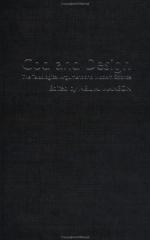|
This section contains 621 words (approx. 3 pages at 300 words per page) |

|
The Teleological Argument
Summary: The Teleological Argument, attributed to William Paley through his book Natural Theology (1802), is an a posteriori argument intended to prove the existence of God.
The Teleological Argument for the Existence of God is the most reasonable to me. Although it is complicated, and has many flaws, it seems to be the closest to perfection of the three argument discussed in class. Its name clearly describes its meaning: the Greek word "telos" means "purpose" or "end." Because this argument seeks to understand or study the end and purpose of the world, such a name is perfect.
William Paley (1743-1805) is the man that this argument is attributed to. He wrote his ideas in his book Natural Theology (1802). He used analogy and comparison to found his theory. His statements are as follow:
- Human artifacts are products of intelligent design.
- The universe resembles human artifacts.
- Therefore the universe is a product of intelligent design.
- But the universe is complex and gigantic, in comparison to human artifacts.
- Therefore, there probably is a powerful and vastly intelligent...
|
This section contains 621 words (approx. 3 pages at 300 words per page) |

|


